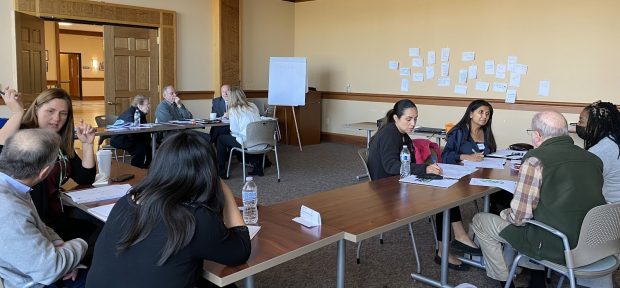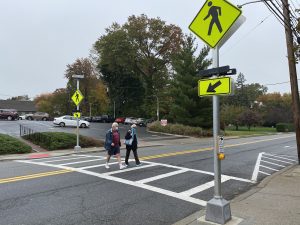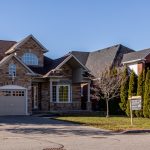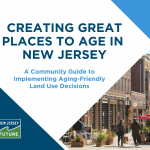New Jersey Future Blog
From Planning With Purpose to Action for All Ages
December 2nd, 2021 by Tanya Rohrbach
Older adults in the U.S. are projected to outnumber children for the first time in U.S. history. By 2030, all of the baby boom generation will be older than 65 years old, and the baby boom generation is the second largest adult generation behind the millennial generation. With 30% of New Jersey’s population over the age of 55, it’s time to design our communities for all ages.
Just as the urban planning and design sectors—which are white-dominated— are having to confront the effects of whiteness on creating disparities and normalizing exclusionary practices, there’s a growing recognition that community design reflects a history of age bias. The idea of age-friendly cities has its origins in a 1991 United Nations resolution that encouraged national governments to incorporate the principles of aging with independence, participation, care, self-fulfilment, and dignity into their programs. The World Health Organization (WHO) then set forth to develop a policy framework to encourage more prevalent and specific actions at the national, regional, and local levels, and in 2007 developed a global guide to age-friendly cities with a framework outlining eight interconnected domains of urban life that affect the well-being and participation of people as they age into older adulthood. A major focus of the framework involves creating the urban environments necessary for older community members to achieve autonomy, participation, and physical and mental wellness.1
In the U.S., states and local communities around the country are actively incorporating the WHO age-friendly framework into their messaging, policies, plans, and projects. Through the AARP Network of Age-Friendly States and Communities, which has developed the framework into a program advocating for livability, a collection of initiatives are connecting with each other to advance their own programs. In partnership with the NJ AARP chapter and other organizations, New Jersey Future (NJF) is part of a collaborative effort to advance age-friendly state policy and local implementation, and with funding support from The Henry and Marilyn Taub Foundation, the Community Foundation of South Jersey, and the Grotta Fund for Senior Care, we’ve been able to conduct NJ-specific age-friendly research, develop a NJ-specific community guide, and work directly with communities to facilitate their local initiatives.

Photo credit: Tanya Rohrbach
We’re excited to kick off our most recent community initiative facilitation with Livingston Township (Essex County). As champion advocates for older adults in the community, staff of the Senior, Youth & Leisure Services Department recognized the need for the municipality to coordinate its decision-making across leadership, departments, boards, and committees to meet the needs of older adults in the community. The eight domains of urban life outlined in
the age-friendly framework intersect throughout the physical and social components of community life, so meeting the needs of older adults extends beyond providing additional programming or services and into community-wide facets of housing, transportation, pedestrian mobility, and other areas concerning infrastructure and land use. As members of the Livingston age-friendly initiative steering committee recognized immediately through their brainstorming activities, making a community more livable for older populations makes it better for everyone. Livingston was able to dedicate resources to an age-friendly initiative through a grant from the Grotta Fund for Senior Care and will continue to advance its program with an intentional effort to make it community-driven and inclusive. It will apply for membership in the AARP network and develop an age-friendly action plan that will guide an ongoing effort to integrate livability into municipal policy and practice based on community need and participation. The Township will continue its age-friendly initiative as a community partner in the North Jersey Age-Friendly Alliance, which is a network of age-friendly leaders dedicated to building collaboratives and advancing efforts “to improve physical environments, increase housing options, promote transportation alternatives, strengthen social supports and foster intergenerational connections.”
Based on efforts to incorporate age-friendly planning into land use planning or vice versa, NJF has worked with several communities to develop age-friendly land use assessment plans that serve as planning tools for making substantive changes to municipal regulations and programs. We checked in with them to find out how they translated those plans into action.

Photo credit: Beth Abbott and Sue Ullrich
Ridgewood Village
In 2020 the Village of Ridgewood installed new lighted crosswalk signage and improved the crosswalk markings and adjacent curbs at a busy crossing in accordance with recommendations in the Aging-Friendly Land-use Assessment for the Village of Ridgewood. Also in 2020, Ridgewood adopted Section 1 of their comprehensive master plan based on an extensive community-wide visioning process. The plan directly reflects the assessment report and input from older residents in the community.
Ridgefield Park Village
The Village of Ridgefield Park is preparing a new master plan and updating zoning regulations, and a “key element of the plan preparation is the aging population of the village and the downtown of the village,” said Ken Ochab, the municipal planner preparing the plan. The Aging-Friendly Land-Use Assessment for the Village of Ridgefield Park “will be the nucleus from which the Master Plan will be prepared,” according to Ochab.
Pompton Lakes
As the Township of Pompton Lakes pursues actions to make the community more livable for all community members, it recognizes the importance of intentional inclusion of its older residents and is aiming to institute an age-friendly coordinator position in the municipality. This position will help to build capacity for an aging-friendly community collaborative in the town and will facilitate community-driven solutions in response to recommendations in the Aging-Friendly Land-Use Assessment for the Borough of Pompton Lakes. For example, Pompton Lakes will work to rehabilitate its civic/senior center, amend land use ordinances, and conduct a housing and transportation needs survey among older residents.
1https://www.who.int/publications/i/item/9789241513500
Related Posts
Tags: aging-friendly, community initiative facilitation, Livingston Township, older adults
















